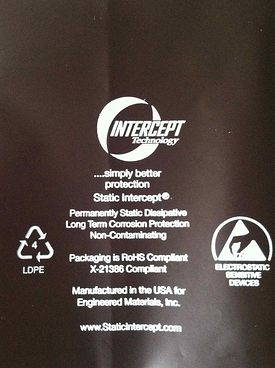 Aren’t all anti-corrosion packaging materials the same?
Aren’t all anti-corrosion packaging materials the same?
No. Barrier protection products work in vastly different ways. The Intercept Technology line of products protects in two ways. First, they act as a moisture barrier. Second, Intercept reacts with and permanently neutralizes corrosive gases to form a corrosive gas barrier. This dual form of protection eliminates the two elements needed to form atmospheric corrosion. Intercept’s mechanism for protection is sacrificial, therefore, it won’t contaminate the product it’s protecting. The typical “waterproof” or vapor barrier bag/shroud concept is to attempt to keep the atmosphere and/or relative humidity from the protected product; whereas the emitting protection products, packaging and canisters, will surround the product with a volatile vapor. More...
Are desiccants needed with Intercept products?
Yes and no. If there are no large voids in the package, then the Intercept will react with the corrosive gases within the package and eliminate the potential danger without desiccating. However, if there are large voids that don’t allow the Intercept material to be close to some areas, then it would be best to utilize desiccants, making sure that the desiccants are not directly touching metals. Please consult with us for your recommended usage.
How do we seal Intercept products?
You can heat seal Intercept products if you wish. In fact, the Intercept polyethylene films heat seal extremely well. But heat sealing is not necessary, as long as you don’t allow a continual flow of air into the package. Folding over the ends, openings, and secure tape-downs are an acceptable closure with the Intercept Technology. In reusable situations or for convenience, zippers, Velcro strips and other closure means are also acceptable. Please keep in mind, when products absolutely require a vacuum and seal, you should consider using our RIBS MVTR bag line, which is ideally suited for packaging extremely sensitive products. More...
How long does Intercept protection last?
Intercept’s protective shelf life is years, possibly decades. Testing from Bell Labs and DuPont has shown that the Intercept products’ life span is multiple years of protection based on material style, gauge, and aggressive environment level exposure; check Liberty’s product page (link to main product page) for individual product specifics. More...
Is there a limit to the item size that Intercept can protect?
In a word, no. For larger applications, Intercept can be made into shrink film or laminated onto very durable flexible materials. Our contractors have made covers for helicopters, planes, tanks, motor vehicles, buildings, even bridges! With our track record, we’re confident we can solve any situation. More...

Find out more about Corrosion Intercept here. And Static Intercept here.
|
More about corrosion in this video:
|
And about Intercept Technology™ in this one:
|
 |
 |
Intercept Technology Packaging products fit within a sustainability strategy because they are reusable, recyclable, do not contain or use volatile components (No VOCs, Not a VCI) and leave a smaller carbon footprint than most traditional protective packaging products.
Liberty Intercept Blog
5 More Reasons for Packaging with Intercept
Posted by Joe Spitz on Mar 31, 2016 3:09:00 PM
No. Barrier protection products work in vastly different ways. The Intercept Technology line of products protects in two ways. First, they act as a moisture barrier. Second, Intercept reacts with and permanently neutralizes corrosive gases to form a corrosive gas barrier. This dual form of protection eliminates the two elements needed to form atmospheric corrosion. Intercept’s mechanism for protection is sacrificial, therefore, it won’t contaminate the product it’s protecting. The typical “waterproof” or vapor barrier bag/shroud concept is to attempt to keep the atmosphere and/or relative humidity from the protected product; whereas the emitting protection products, packaging and canisters, will surround the product with a volatile vapor. More...
Are desiccants needed with Intercept products?
Yes and no. If there are no large voids in the package, then the Intercept will react with the corrosive gases within the package and eliminate the potential danger without desiccating. However, if there are large voids that don’t allow the Intercept material to be close to some areas, then it would be best to utilize desiccants, making sure that the desiccants are not directly touching metals. Please consult with us for your recommended usage.
How do we seal Intercept products?
You can heat seal Intercept products if you wish. In fact, the Intercept polyethylene films heat seal extremely well. But heat sealing is not necessary, as long as you don’t allow a continual flow of air into the package. Folding over the ends, openings, and secure tape-downs are an acceptable closure with the Intercept Technology. In reusable situations or for convenience, zippers, Velcro strips and other closure means are also acceptable. Please keep in mind, when products absolutely require a vacuum and seal, you should consider using our RIBS MVTR bag line, which is ideally suited for packaging extremely sensitive products. More...
How long does Intercept protection last?
Intercept’s protective shelf life is years, possibly decades. Testing from Bell Labs and DuPont has shown that the Intercept products’ life span is multiple years of protection based on material style, gauge, and aggressive environment level exposure; check Liberty’s product page (link to main product page) for individual product specifics. More...
Is there a limit to the item size that Intercept can protect?
In a word, no. For larger applications, Intercept can be made into shrink film or laminated onto very durable flexible materials. Our contractors have made covers for helicopters, planes, tanks, motor vehicles, buildings, even bridges! With our track record, we’re confident we can solve any situation. More...
Find out more about Corrosion Intercept here. And Static Intercept here.
More about corrosion in this video:
And about Intercept Technology™ in this one:
Intercept Technology Packaging products fit within a sustainability strategy because they are reusable, recyclable, do not contain or use volatile components (No VOCs, Not a VCI) and leave a smaller carbon footprint than most traditional protective packaging products.
Topics: barrier packaging, Intercept Technology, anti-corrosion barrier packaging
Related Posts
Your Lifeline in a Chaotic Supply Chain
Packaging's Crucial Role vs FOD
Statue of Liberty Copper Patina = Corrosion
Leave a Comment